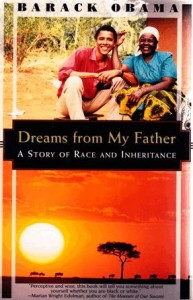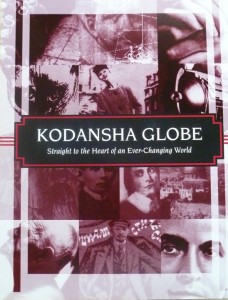Who Knew? Paved Roads Were the Result of Lobbying by Bicyclists
This tweet by prolific travel essayist Taras Grescoe caught my eye.
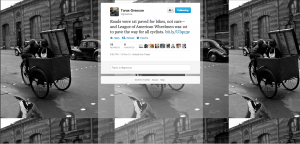
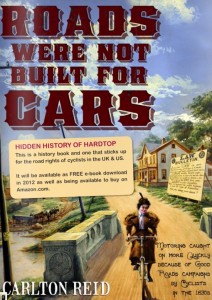 I followed the link to a website for what turns out to be a forthcoming book titled Roads Were Not Built for Cars, by Carlton Reid. At the site I found an interior spread with a cover and author info.
I followed the link to a website for what turns out to be a forthcoming book titled Roads Were Not Built for Cars, by Carlton Reid. At the site I found an interior spread with a cover and author info.
I had not really thought about it much before, but what I’ve read here reveals the author’s revisionist thesis that while Henry Ford and his ilk were eager to claim credit for the advent of paved roads in the 1920s, there had actually been a “Good Roads” movement harking as far back as the 1880s, when bicyclists began advocating for better riding surfaces. The writing and publication of the book has evidently been sponsored by bicycle makers in the UK and North America; with this underwriting it’s going to be a free, no-charge ebook download. I find what I’ve read in the spreads at the website reveals a fascinating, heretofore hidden aspect of modern transportation history–the development of decent roads not only made travel more enjoyable 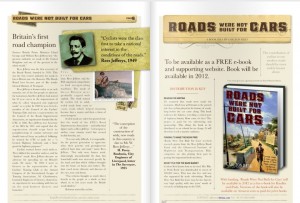 for individuals in all kinds of wheeled vehicles, it also enabled farmers and tradespeople to bring their goods to more readily bring their goods to market, spurring economic growth. If you’re interested in reading more on this topic I urge you to go to the book’s website and leave your email address so you can be notified when the book is ready.
for individuals in all kinds of wheeled vehicles, it also enabled farmers and tradespeople to bring their goods to more readily bring their goods to market, spurring economic growth. If you’re interested in reading more on this topic I urge you to go to the book’s website and leave your email address so you can be notified when the book is ready.
Now that I think more about this, I’m reminded of a historical point raised in Alex Shoumatoff’s superb book, The Mountain of Names–a history of kinship that I had a chance to republish in paperback in 1995–which reported that the appearance of the bicycle in rural villages of Europe in the 19th century overnight extended the “courtship range” of male suitors to a great many more miles than had ever previously been the case. I’ve previously blogged about Shoumatoff’s book in relation to the Mormons’ practice of posthumous baptism, which the late Christopher Hitchens tartly dubbed “a crass attempt at mass identity theft from the deceased.”

